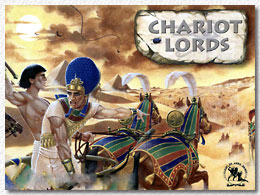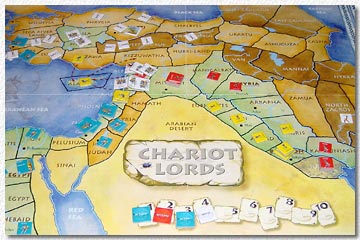
| Designer | Charles Vasey |
| Publisher | Clash of Arms Games |
| released | 1999 |
| Players | 3-4 |
| Playing Time | 6 hours |
 |
||||||||||
|
reviewed by Peter Riedlberger
Chariot Lords is a Britannia clone situated in the ancient Middle East. Like all Britannia games, Chariot Lords has each player lead a "team" of different peoples which do not actually belong or work together (at least not officially) but add up their victory points. So, the white player commands Hittites as well as Nubians, Hebrews and others.
There are two rule sets for Chariot Lords (actually, there are even more, but those are the most important): Those furnished with the game, which are in fact unplayable (complicated battle system, complicated scoring conditions which are hard to keep track of), and the so called short rules. We've always played the latter. You can download them from Web-Grognards (beware, links to a doc). So everything I write is true for the short rules - not for those rules which come in the game box.
Chariot Lords differs from other Britannia clones in three aspects: First, scoring is quite straightforward. Every slain enemy unit is one point. Every country occupied at the end of one's turn is two points (most of the time, but there are a few exceptions, e.g. mountain is one, and desert is zero). Every people has one (rarely two or even three) special deeds to accomplish. Once achieved, you've got the extra score. Those deeds can be very easy (Hittites: in any one turn control six hill areas north of Ugarit, worth 20 points) or rather difficult (Assyria: in any one turn control Memphis, worth 30 points). Of course, the game is balanced in so far as every colour has its easy and its hard challenges. Overall this means much less looking up of victory point conditions compared to Birtannia or Hispania. This is neither an advantage nor a disadvantage - it rather makes Chariot Lords different: Quicker and more straightforward, but less complex.
The other main difference is that there is no fixed turn order of the peoples. The fixed turn order is an extremely important mechanism for Britannia: This guarantees for example that the Saxons move before the Normans, so Harold the Saxon loser is in play when William arrives for the final showdown. The fixed turn order allows the game designer to stake out the order of history (err... game play). In Chariot Lords it can happen that Assur (most powerful people of all) moves last. Assur gets lots of new counters in that particular turn and conquers half of the known world. Then, Assur count victory points. In the next turn, the oppressed neighbours might strike back together, dismembering the Assyrian empire. But surprise, surprise: The Assur chit is drawn first, Assur conquers some additional areas and, worst of all, counts victory points again. If this happens, the game might be decided.
 Is this a design mistake? Many reviewers think so. I
do not agree. If you want to win Britannia you must know the victory condition of your
peoples and those of your enemies by heart. Therefore it can be very frustrating to play
Britannia with seasoned players if you aren't one yourself. The random turn order
makes for different gameplay every time. Then, all Britannia clones allow for
unhistorical alliances (which are probably unintended by the designer). In Chariot Lords,
it's not as easy as this. For example, Sumer needs the Babylon once as victory
condition but is usually too weak to conquer it single-handed. So Assur (same colour and
therefore player!) can do it for them. But if Assur conquers Babylon and withdraws, the
red player can't be sure about the turn order. Perhaps the Elam chit is drawn first
and moves in ...
Is this a design mistake? Many reviewers think so. I
do not agree. If you want to win Britannia you must know the victory condition of your
peoples and those of your enemies by heart. Therefore it can be very frustrating to play
Britannia with seasoned players if you aren't one yourself. The random turn order
makes for different gameplay every time. Then, all Britannia clones allow for
unhistorical alliances (which are probably unintended by the designer). In Chariot Lords,
it's not as easy as this. For example, Sumer needs the Babylon once as victory
condition but is usually too weak to conquer it single-handed. So Assur (same colour and
therefore player!) can do it for them. But if Assur conquers Babylon and withdraws, the
red player can't be sure about the turn order. Perhaps the Elam chit is drawn first
and moves in ...
Last major difference: There is no area-based population growth in Chariot Lords. For each two counters you lose, you may revive one (and kill the other for ever). This makes for much faster gameplay too.
Chariot Lords plays different from other Britannia clones. It can be frustrating if one player just wins because he was once very lucky with the turn order. But the others can still gang up and stop him after all. The additional random element of Chariot Lords does really have it advantages. I've played Chariot Lords more often than any other Britannia clone in the last couple of years simply because it's a new experience every time.
Please forget what you could read earlier on this web page. In fact, the rules are quite clear about this case too. 9.4 states:
"Certain nations enter play by invading stated areas. Place the units in the chosen areas and then move normally that turn (they are not required to leave two units behind for every other nation's unit in the area that they invaded). If all invading units cannot enter the map, then they may wait off-map."
So the eight Nubians suddenly appear in Thebaid. They can move three areas without hindrance, and so they threaten any Egyptian area (Thebaid, Upper E., Lower E., Naucratis, On are all within 3 spaces from Thebaid). If you take this rule litterally, only those units can wait off-map which CANNOT enter. Therefore, no voluntary waiting for Piye.
We've obviously always played this wrong (with other invasions as well) but it's probably mostly important for the Nubians. I do like this rule and can't wait to see it live in our next game of Chariot Lords.
And thanks to Charles Vasey for all his patience with me till I finally understood what he had clearly stated in the rules :-)
| add/read comments |
©2004, Westpark Gamers